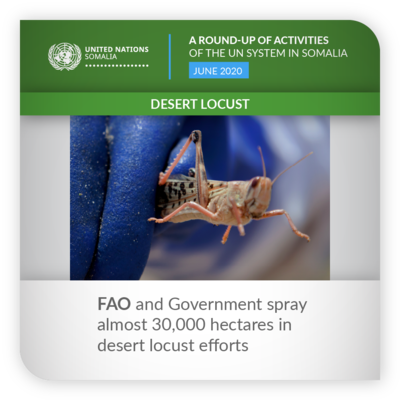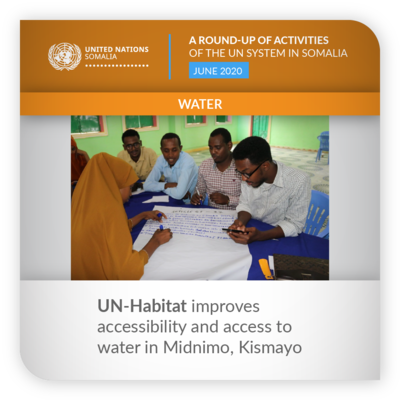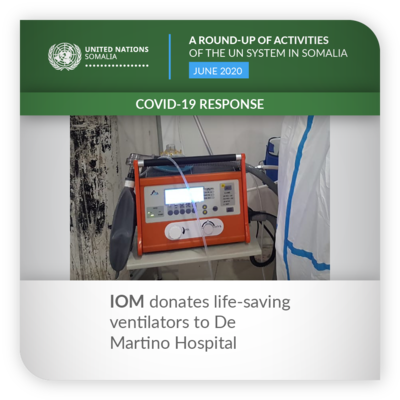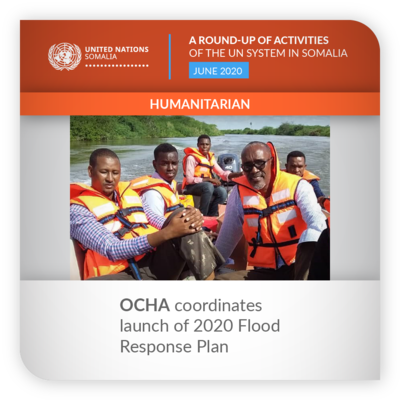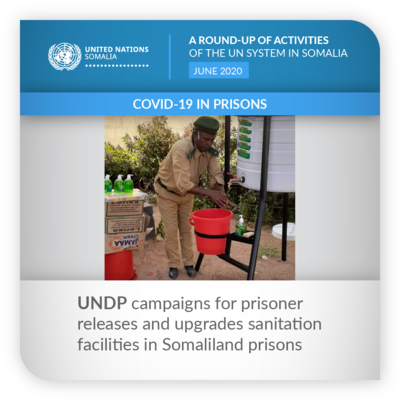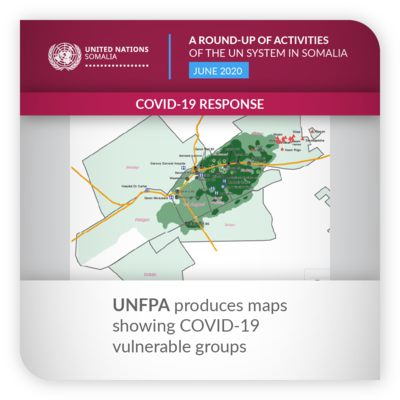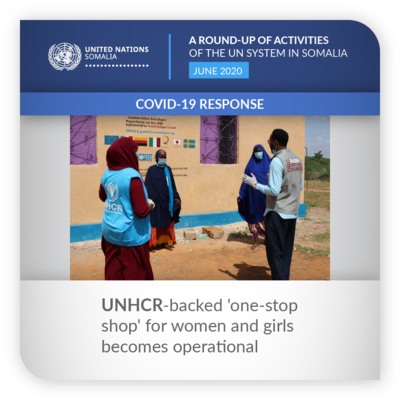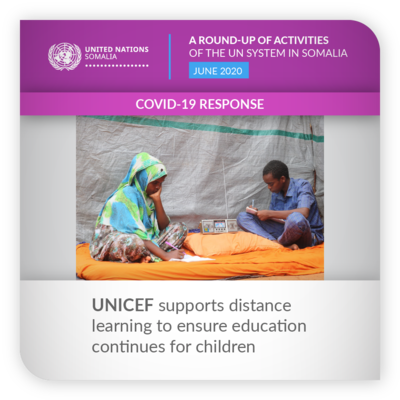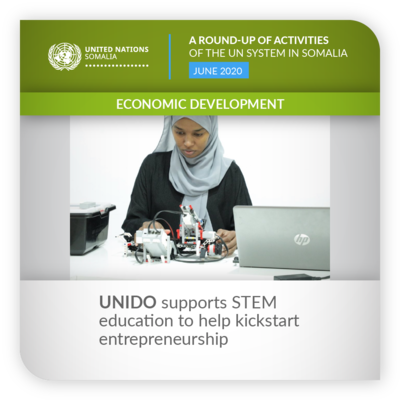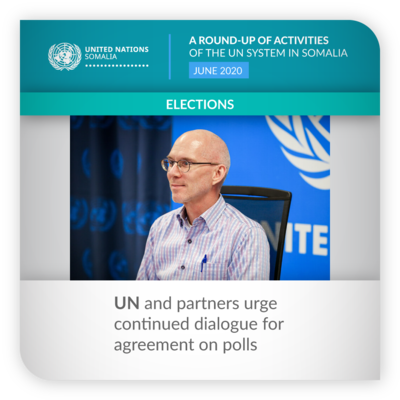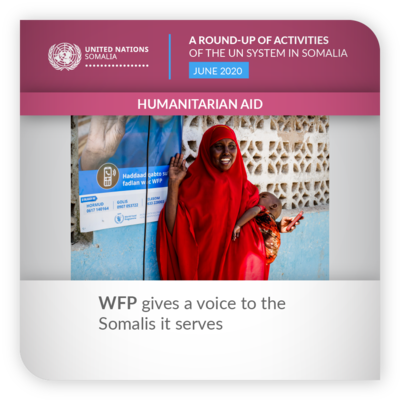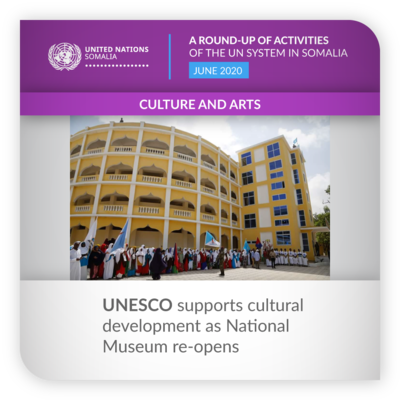A Round-up of Activities Oof the UN in Somalia in June 2020
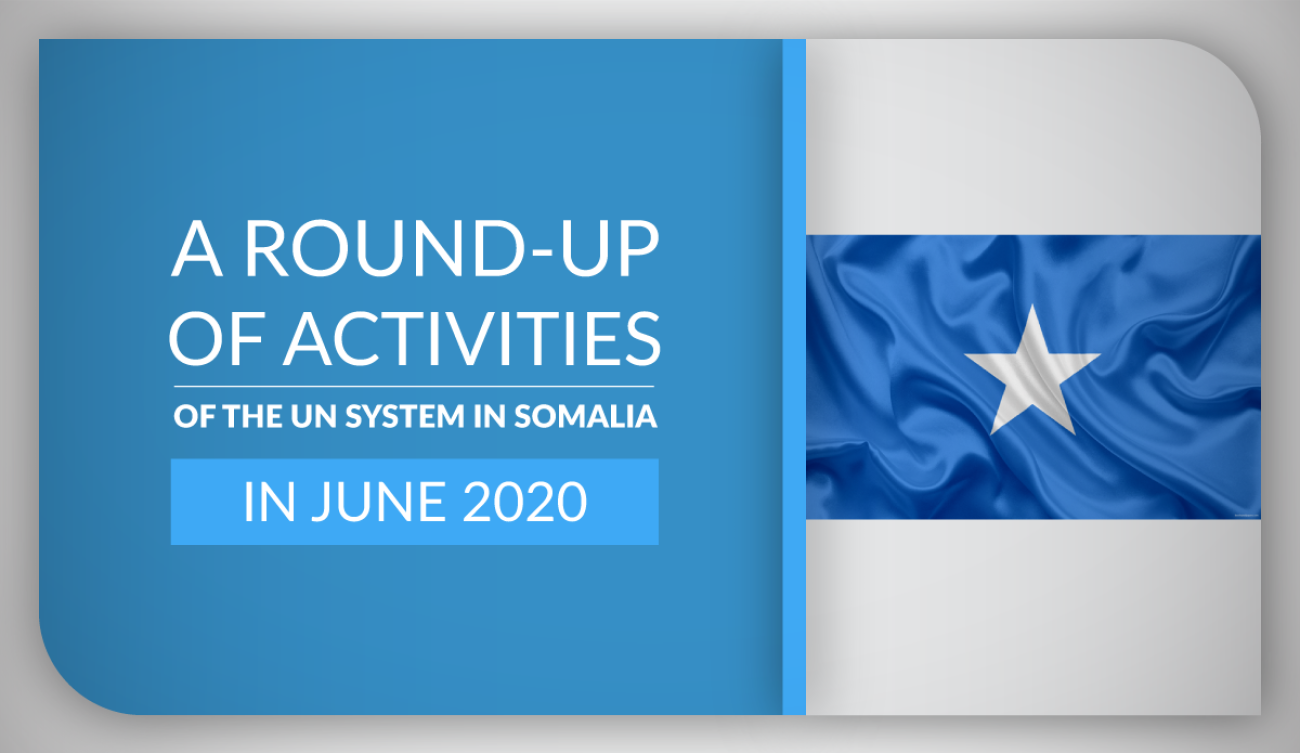
Highlights from the activities of the UN system in Somalia for the month of June, 2020.
|
|
Desert locust | FAO and Government spray almost 30,000 hectares in desert locust efforts By air and ground, desert locust control operations are protecting people’s lives and livelihoods across Somalia. Ahead of the main Gu harvest in July, FAO and the Federal Government have safely sprayed 28,930 hectares with bio-pesticides to reduce desert locust populations. These efforts have saved an estimated 57,824 metric tonnes of staple food from desert locust damage, valued at over $17 million and sufficient to feed 385,490 people for a year. They have further protected feed and pasture sources needed by 26,842 pastoral households to keep their livestock productive and able to nourish their families. FAO highlights that control operations must be funded and sustained in the second half of 2020 to continue protecting lives, livelihoods and food security in Somalia. |
|
|
|
Water | UN-Habitat improves accessibility and access to water in Midnimo, Kismayo UN-Habitat has completed the construction of a 3.3 kilometre gravel road that links Midnimo village and Kismayo town, in Jubaland state. This road is the first in the area to be constructed with a drainage system to help mitigate flooding. It will also improve access to the village and ensure connectivity to Kismayo, serving 13,000 beneficiaries and ensuring they access basic services and job opportunities. The water intervention has so far served 2,244 beneficiaries who are being provided with 86 litres of water per family per day, shielding them from the impact of the COVID-19 pandemic that has led to an increase in the prices of water, food and non-food items. The UN agency is also providing safe water as well as knowledge on hygienic practices in the wake of the COVID 19 pandemic. This is an integrated approach to assist refugees, returnees and vulnerable host communities living in Midnimo village, a community exposed to multiple catastrophes as they suffer the effects of floods, acute water shortage and the COVID- 19 pandemic. UN-Habitat has been active in Midnimo village providing housing, constructing a community centre and the development of a comprehensive site plan for potential developments. These projects have been funded by The United Nations Trust Fund Human Security and the Swedish Embassy and have been implemented through local partnerships with the government of Jubaland and other UN partners, such as IOM and UNHCR. https://twitter.com/UNHabitat_Som/status/1234815521729712129 |
|
|
|
COVID-19 response | IOM donates life-saving ventilators to De Martino Hospital IOM donated more than 20 ventilators and other medical supplies to help the Federal Government of Somalia (FGS) to set up an intensive care unit at De Martino Hospital in Mogadishu, the main public hospital treating COVID-19 patients in Somalia. The donation is funded by the multi-donor Somalia Humanitarian Fund (SHF) and it comes against the backdrop of daily increases in number of COVID-19 cases in the country. With the SHF funding, IOM is also providing medical specialists and donating medical equipment, such as personal protective equipment, including masks and gloves. https://www.iom.int/news/covid-19-ventilators-provided-help-somalia-fight-pandemic |
|
|
|
Humanitarian | OCHA coordinates launch of 2020 Flood Response Plan OCHA worked with partners to launch the 2020 Flood Response Plan, the draft of which has served as the basis for response since flooding began. The plan outlines support to the Federal Government and Federal Member States to meet the needs of nearly a million people affected by the Gu’ seasonal rains. Since April, the floods have caused widespread displacement and death, as well as the destruction of infrastructure and property in 29 districts across the country. Of the 918,667 people affected, 415,000 were displaced from their homes. At least 29 people have been killed. The plan seeks $59.85 million to deliver life-saving assistance over three months. |
|
|
|
COVID-19 response | UNDP campaigns for prisoner releases and upgrades sanitation facilities in Somaliland prisons UNDP is working with the Somaliland Ministry of Justice (MoJ) to advocate for the release of low-risk prisoners, pregnant women and other vulnerable persons to reduce overcrowding in prisons and prevent the spread of COVID-19. Almost 939 prisoners have been released by the Somaliland government so far. UNDP and the MoJ are have also organised provision of handwashing facilities and hygiene training to prison staff and prisoners at all 14 prisons in Somaliland. |
|
|
|
COVID-19 response | UNFPA produces maps showing COVID-19 vulnerable groups UNFPA is producing digitized mapping of structures in the Banadir region to inform the Somali government and other stakeholders on the best modalities on working on responding to the COVID-19 pandemic and on where resources should be concentrated. ‘COVID-19 Vulnerability Mapping by Risk Factors’ has so far pinpointed that internally displaced people are one of the most vulnerable populations to the spread of COVID-19 due to the nature of their settlements and inadequate social amenities available to them. UNFPA is also producing similar mapping for other regions. https://somalia.unfpa.org/en/publications/covid-19-vulnerability-mapping... |
|
|
|
COVID-19 response | UNDP campaigns for prisoner release and sanitation upgrades in Somaliland UNDP is working with the Somaliland Ministry of Justice (MoJ) to advocate for the release of low-risk prisoners, pregnant women and other vulnerable persons to reduce overcrowding in prisons and prevent the spread of COVID-19. Almost 939 prisoners have been released by the Somaliland government, so far. UNDP and the MoJ are have also organised the provision of handwashing facilities and hygiene training to prison staff and prisoners at all 14 prisons in Somaliland. |
|
|
|
COVID-19 response | UNICEF supports distance learning to ensure education continues for children As the COVID-19 virus outbreak spread across Somalia, the majority of its schools were temporarily closed. The suspension of classes disrupted children’s learning and upended their lives. With partners, UNICEF harnessed technology and put in place alternative learning platforms, such as radio and television broadcasts, to reduce the impact of the school closures. More than 95,000 children are benefitting from these initiatives and continue their learning at home. |
|
|
|
Economic Development | UNIDO supports STEM education to help kickstart entrepreneurship Over the course of the past few months, UNIDO has been working with partners to improve education in the areas of science, technology, engineering and mathematics (STEM). Collaborating with the HANO Academy and Somali STEM Society, the UN agency has been providing them with access to STEM teacher training and equipment to boost their STEM teaching in Somalia's primary and secondary schools. The support is part of a broader plan of UNIDO and its partners, along with the Somali STEM Society, to build the capacity of targeted STEM instructors from various training academies, institutes, and polytechnics. UNIDO is also working with the Ministry of Commerce and Industry, the HANO Academy, the Somali Chamber of Commerce and Industry to find ways to link STEM with entrepreneurship, blending it with traditional entrepreneurship training and development. In the future, it hopes to incorporate STEM as part of the entrepreneurship development training programme delivered by the UNIDO-backed EDUs in Mogadishu, Kismayo and Baidoa as a way to offer potential entrepreneurs an innovative way to brainstorm over their business ideas, develop plans for revenue-generating business, examine and analyze real-life entrepreneurial experiences, come up with alternative ways to design business plans and business pitch for their own companies. |
|
|
|
Elections | UN and partners urge continued dialogue for agreement on polls The United Nations in Somalia was one of the country’s international partners which issued a joint statement emphasizing the continued need for Somalis to engage in inclusive dialogue to forge the widest possible agreement on the topic of the country’s elections, and underscoring the importance of a complete and comprehensive dialogue among the leaders of the Federal Government and Federal Member States. https://unsom.unmissions.org/federal-elections-and-political-consensus-building |
|
|
|
Humanitarian aid | WFP gives voice to the Somalis it serves WFP values feedback that allows it to better understand how its assistance is making a difference to the lives of Somalis. It is with this in mind that it set up its Complaints and Feedback Mechanism, which allows the UN agency to engage directly with the people it serves, giving a voice to the communities where WFP works, and to receive first-hand feedback on how its provision of assistance could be improved. The Mechanism allows affected populations to provide the feedback through a toll-free hotline, community feedback sessions, help desks and suggestion boxes. |
|
|
|
Culture | UNESCO supports cultural development as National Museum re-opens Since the signing of a Memorandum of Understanding to strengthen cooperation in the fields of culture and education, which was signed with the President of Somalia during the UNESCO Director General’s historic visit to Mogadishu on 11 February 2020, UNESCO has been working closely with the Ministry of Education, Culture and Higher Education, the Somali National Commission for UNESCO and the Permanent Delegation of the Federal Republic of Somalia to UNESCO to develop a National Strategy for Culture, which will include a programme of capacity building and support for the staff of the National Museum. https://en.unesco.org/news/federal-republic-somalia-reopens-its-national-museum-mogadishu |

